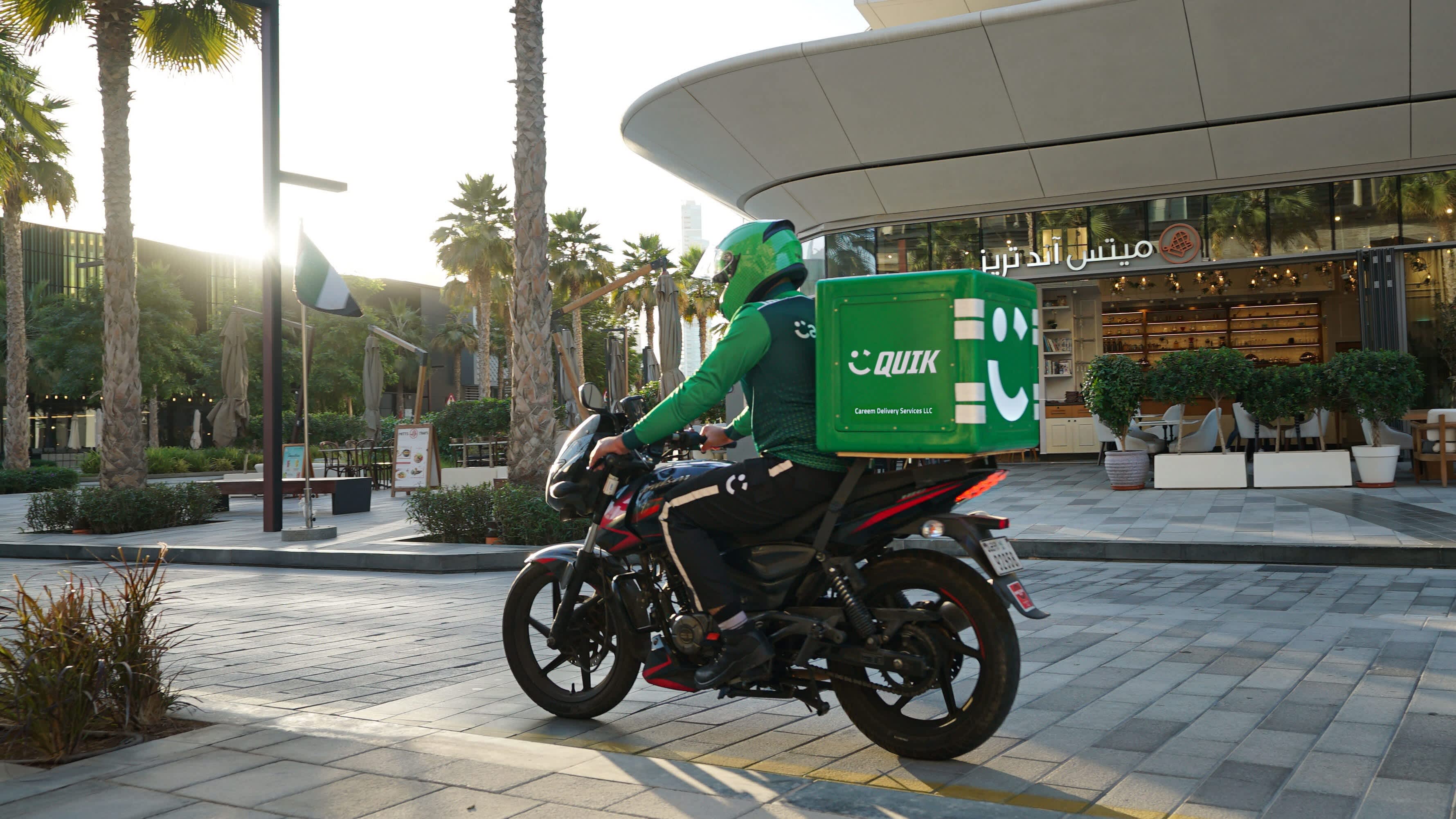A Careem Quik driver ready to deliver a grocery order in Dubai, United Arab Emirates.
Careem
DUBAI, United Arab Emirates – The carpool app Careem, a subsidiary of Uber Technologies, is joining the growing “dark store” space with the launch of its new fast grocery delivery service, Careem Quik.
The service, which combines the warehouse infrastructure of specially designed stores with shortened delivery times, adds Careem to an international pool of start-ups that have seen booming investments in a model that aims to completely disrupt the industry. traditional grocery store.
Dark Stores, next to Dark Kitchens, are shops and kitchens closed to the public, housing products intended only for ordering online.
“Our real competitor is the offline supermarket. That’s where the majority of customers spend their time,” Chase Lario, grocery store manager at Careem, told CNBC before the launch was announced. “The grocery store is one of the few industries that has not changed dramatically from a customer perspective over the past hundred years. ”
“We don’t generally think this is a great solution to the problem that users are facing,” Lario said. “That’s really what we’re trying to do here, is to drastically simplify the way people shop.”
The company aims to be able to provide its rapid delivery service to nearly half of Dubai by the end of this year, and to the entire city next year, with 100 stores planned both in the Arab Emirates. United and Saudi Arabia in 2022. Careem also intends to automate the process over time through its partnership with US sidewalk robotic delivery start-up Kiwibot.
Careem already offers shopping delivery on its app through partnerships with local merchants, whose delivery times vary but often exceed an hour. With Quik, Careem controls the entire supply chain, which he says will allow better control over price, speed, reliability and inventory. He says he’s aiming for grocery delivery times as short as 15 minutes.
The threat to supermarkets
The news comes against the backdrop of a global supply chain crisis affecting nearly every aspect of e-commerce. But Lario says Careem Quik’s operation has so far not been affected.
“Part of the beauty of dark stores is that they are relatively straightforward in their requirements. Refrigerators, freezers and shelves and a few basic appliances, which allow them to be so efficient,” he said. declared. “You’re talking about 10 times the amount of revenue per square foot of a traditional supermarket. And luckily everything we needed was readily available.”
The dark store model will bring the consumer price down to full parity with supermarkets, Lario said, highlighting the threat it poses to mainstream retailers who often already have strained financial models and struggle to keep pace. demand.
“It takes a lot longer to prepare and it’s a lot more complex,” added Lario. “You see things like price inflation setting in. With Careem Quik the model is really working and we will be able to compete with some of the bigger supermarkets in the market.”
Although the investment figure for the new service was not disclosed, Lario said the development of the service is fully funded by the company itself. He sees the company hiring new drivers in the hundreds and potentially in the thousands to meet demand.
The Middle East and North Africa grocery market is now a $ 0.4 to $ 0.5 trillion industry, according to Careem, and it predicts that the online grocery market will generate more. $ 11 billion by 2025.
Great investor appetite
Careem’s foray into e-commerce from “dark stores” to groceries will bring the Middle East into the already booming shopping shift that has been supercharged during pandemic lockdowns. As of April 2021, investors had already invested more than $ 14 billion in on-demand grocery delivery services around the world, according to PitchBook Data. In the first four months of 2021, venture capital investments in rapid delivery applications had already exceeded the total volume of investment in the sector for 2020.
And this investor appetite for delivery services continues to grow. Turkish start-up Getir, which promises grocery deliveries in as little as 10 minutes, is currently valued at $ 7.7 billion following its announces the acquisition of British rival Weezy, which previously raised more than $ 25 million from venture capital firms.
The Carpool Careem app is displayed on an iPhone in a Dubai mall.
Christophe Brochet | Bloomberg | Getty Images
Getir raised more than $ 1 billion in November from investors such as Silver Lake, Mubadala and Sequoia. Europe is also teeming with start-ups competing with traditional supermarkets like German food delivery giant Delivery Hero, which recently bought a minority stake in online grocery start-up Gorillas.
The acquisitions by the American grocery start-up Gopuff of the British companies Dija and Fancy represent even more transactions in a boiling market, which is currently undergoing increasing consolidation as the numerous start-ups struggle to differentiate this. that they can offer.
Careem Quik launch comes in the middle reports that Uber is currently in talks with senior management at Careem to attract outside investors into the company and allow greater decision-making by the branch’s Middle East executives on its strategy. Careem has not commented on the report.
Careem is a super app, which means its range of services – from running, item delivery, bike rental, food and grocery delivery, money transfer, booking a cleaner or even scheduling a PCR test – can all be ordered on the same app. The Dubai-based company was acquired by Uber for $ 3.1 billion in 2019 and operates in 13 countries and more than 100 cities in the Middle East, South Asia and Africa.



